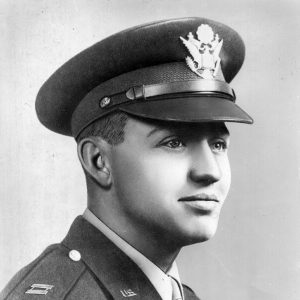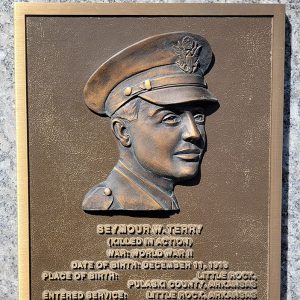calsfoundation@cals.org
Seymour W. Terry (1918–1945)
Seymour W. Terry was an officer in the U.S. Army during World War II and a recipient of the Medal of Honor. An Arkansas native, Seymour W. Terry served as a first lieutenant in the 382nd Infantry Regiment, part of the Ninety-sixth Infantry Division.
Seymour Terry was born in Little Rock (Pulaski County) on December 11, 1918. Terry attended the University of Arkansas (UA) in Fayetteville (Washington County) and was a member of the Sigma Alpha Epsilon fraternity.
Seymour Terry’s division, the Ninety-sixth, trained in Hawaii in 1944 before being deployed to the Philippines in October 1944. Following the campaign in the Philippines, Lieutenant Terry and his regiment participated in the Battle of Okinawa, during which he led an attack on the strongly defended Zebra Hill on May 11, 1945. During the attack, Japanese soldiers unleashed heavy fire on Terry and his men. Terry withstood the attack in order to secure satchel charges and grenades and then proceeded to run thirty yards in the direction of the enemy and destroy the first pillbox with an ignited charge. He subsequently moved from enemy stronghold to enemy stronghold using grenades to bombard the enemy and then utilized heavy rifle fire to thwart the Japanese soldiers’ escape. By the conclusion of his assault on the four pillboxes, Terry had killed twenty Japanese soldiers and destroyed three machine guns.
When a heavy Japanese grenade barrage once again stalled the advance, Terry identified the source of the enemy fire and launched a solo attack on the Japanese position. Armed with six satchel charges, he threw explosives into the enemy’s position and killed an additional ten Japanese soldiers when he and his men overtook their position. When moving toward a nearby ridge, the two assault platoons under his command came under heavy machine gun and mortar fire. Terry ran 100 yards over dangerous and fire-filled landscape to order the support platoon to engage in a flanking maneuver. When this attack was also stifled, Terry initiated another solo attack. He hurled grenades toward enemy entrenchments, forcing them to retreat, leaving behind five dead soldiers. Following the actions of Terry, the support platoon charged the retreating Japanese soldiers and overtook them. Shortly after the attack, Terry received a mortal wound from the burst of an enemy mortar shell while he was organizing his company to prepare for a potential counterattack. He died from complications of his wound on May 11, 1945. Terry is buried in Roselawn Memorial Park in Little Rock.
For his actions during the Battle of Okinawa, Terry was promoted to the rank of captain and awarded the Medal of Honor posthumously on March 6, 1946. Terry Village, a post–World War II temporary housing unit on the UA campus, was named in honor of Terry and his service.
For additional information:
Lang, George, Raymond L. Collins, and Gerard F. White, eds. Medal of Honor Recipients, 1863–1994. Vol. 2, World War II to Somalia. New York: Facts On File, Inc., 1995.
Leflar, Robert A. The First 100 Years: Centennial History of the University of Arkansas. Fayetteville: University of Arkansas Foundation Inc., 1972.
“Medal of Honor Recipients—World War II (T–Z).” United States Army Center of Military History. https://www.army.mil/medalofhonor/citations23.html(accessed February 1, 2022).
David K. Graham
Purdue University
 Seymour W. Terry
Seymour W. Terry  Seymour W. Terry Plaque
Seymour W. Terry Plaque 




Comments
No comments on this entry yet.